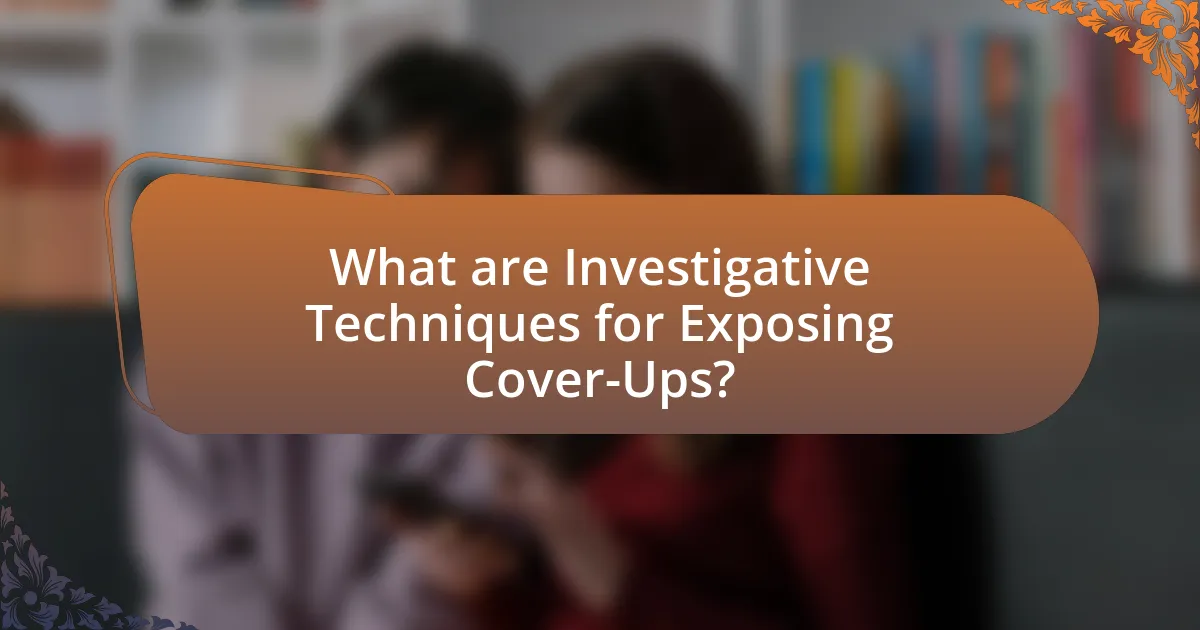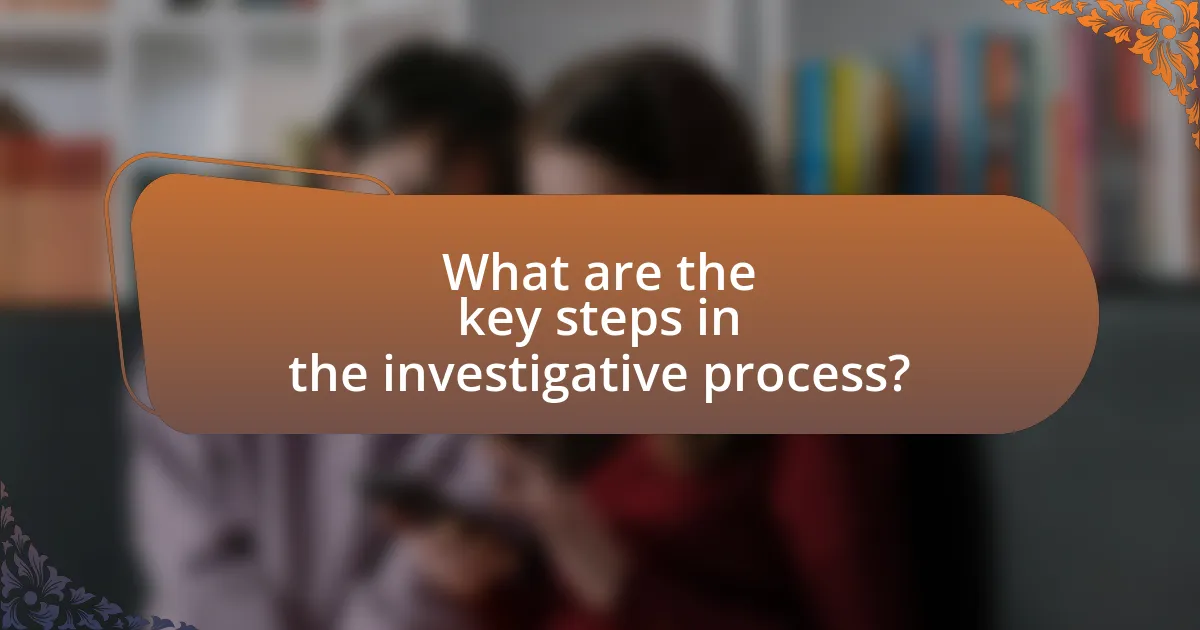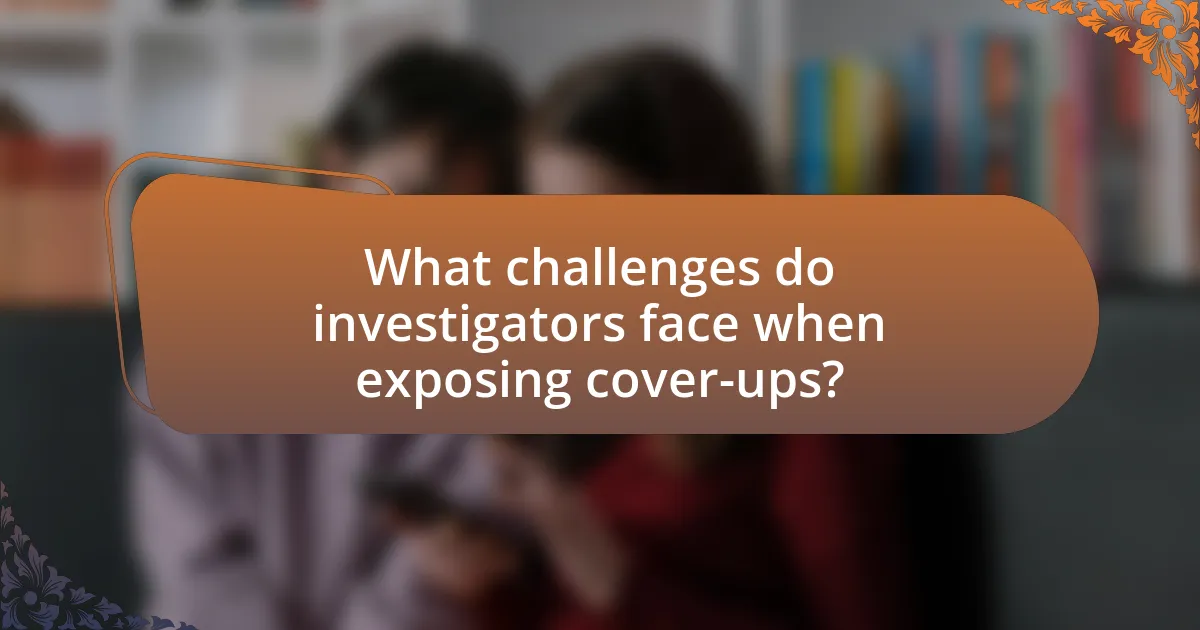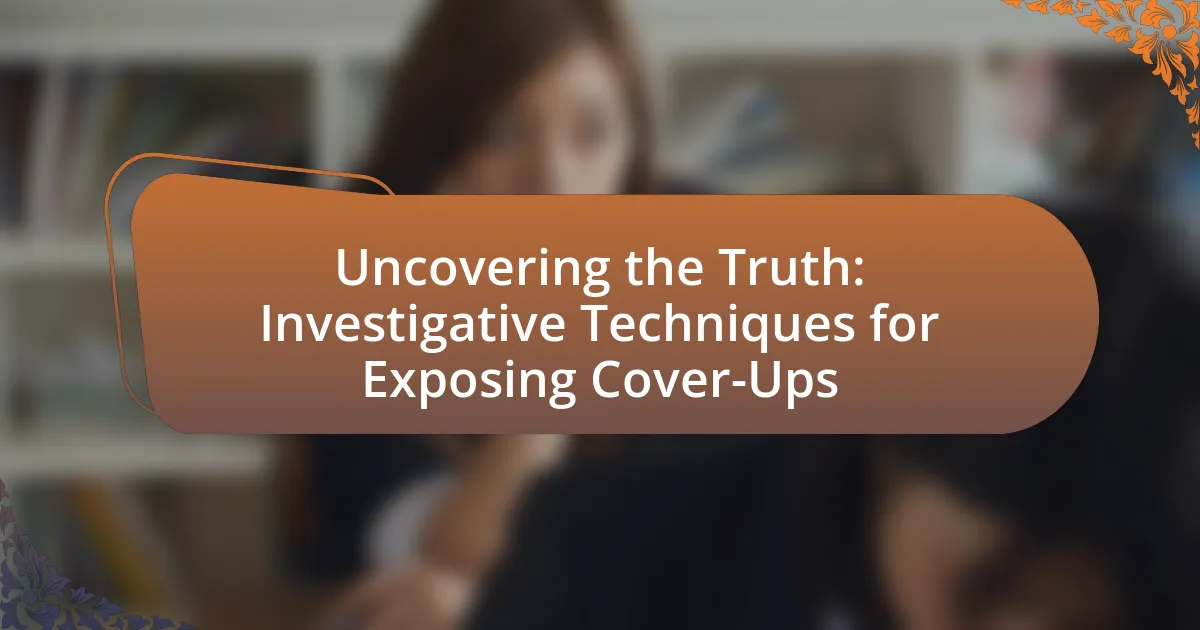The article “Uncovering the Truth: Investigative Techniques for Exposing Cover-Ups” focuses on various methods employed to reveal concealed information and ensure accountability in society. It outlines investigative techniques such as document analysis, whistleblower interviews, and data triangulation, highlighting their effectiveness compared to traditional methods. The article also discusses the essential skills required for investigators, the adaptation of techniques to different types of cover-ups, and the importance of uncovering the truth for fostering public trust and social change. Additionally, it addresses the challenges investigators face, the impact of legal and ethical considerations, and best practices for conducting thorough and accurate investigations.

What are Investigative Techniques for Exposing Cover-Ups?
Investigative techniques for exposing cover-ups include thorough document analysis, whistleblower interviews, and data triangulation. Document analysis involves scrutinizing public records, emails, and reports to identify inconsistencies or hidden information. Whistleblower interviews provide firsthand accounts that can reveal critical details about the cover-up, as seen in cases like the Watergate scandal where insiders played a key role in uncovering the truth. Data triangulation involves cross-referencing multiple sources of information to validate findings, ensuring that the evidence is robust and credible. These techniques have been effectively utilized in various high-profile investigations, demonstrating their efficacy in revealing concealed truths.
How do these techniques differ from traditional investigative methods?
These techniques differ from traditional investigative methods primarily in their reliance on advanced technology and data analysis. Traditional methods often depend on physical evidence and eyewitness accounts, while modern techniques utilize digital forensics, social media analysis, and data mining to uncover hidden information. For instance, the use of algorithms to analyze large datasets can reveal patterns that would be impossible to detect through conventional means, enhancing the efficiency and effectiveness of investigations. This shift towards technology-driven approaches allows for a more comprehensive understanding of complex cases, as evidenced by the increasing use of these methods in high-profile investigations, which have led to significant breakthroughs that traditional methods alone could not achieve.
What specific skills are required for effective investigative techniques?
Effective investigative techniques require critical thinking, attention to detail, analytical skills, and strong communication abilities. Critical thinking enables investigators to assess information objectively and make sound judgments. Attention to detail is crucial for identifying inconsistencies and uncovering hidden facts. Analytical skills allow for the synthesis of complex data and the drawing of meaningful conclusions. Strong communication abilities facilitate the gathering of information from various sources and the presentation of findings clearly. These skills collectively enhance the effectiveness of investigations, as evidenced by successful case resolutions in law enforcement and journalism, where thorough analysis and clear reporting have led to significant breakthroughs.
How do investigative techniques adapt to different types of cover-ups?
Investigative techniques adapt to different types of cover-ups by employing tailored approaches that address the specific nature and context of the concealment. For instance, in cases of corporate fraud, investigators may utilize forensic accounting to analyze financial records, while in political cover-ups, techniques such as whistleblower interviews and document analysis are often prioritized. The adaptation is crucial because each cover-up may involve unique methods of deception, requiring investigators to adjust their strategies accordingly. Historical examples, such as the Watergate scandal, illustrate how investigative journalists adapted their techniques to uncover hidden information through persistent questioning and source verification, ultimately leading to significant political accountability.
Why is uncovering the truth important in society?
Uncovering the truth is crucial in society because it fosters accountability and transparency, which are essential for a functioning democracy. When the truth is revealed, it allows citizens to make informed decisions, hold leaders accountable, and challenge injustices. For instance, investigative journalism has historically exposed corruption, such as the Watergate scandal, which led to significant political reforms and increased public trust in the media. Furthermore, studies show that societies with higher levels of transparency experience lower levels of corruption and better governance, reinforcing the importance of truth in maintaining social order and justice.
What impact do cover-ups have on public trust?
Cover-ups significantly erode public trust. When individuals or organizations conceal information, it creates a perception of dishonesty and lack of accountability. Historical examples, such as the Watergate scandal, demonstrate that once the truth is revealed, public confidence in institutions can decline sharply, leading to long-term skepticism. According to a 2019 Pew Research Center study, 70% of Americans believe that government officials often hide information from the public, indicating a widespread distrust fueled by perceived cover-ups.
How can exposing cover-ups lead to social change?
Exposing cover-ups can lead to social change by revealing hidden injustices and prompting public awareness and action. When individuals or organizations uncover and disseminate information about unethical practices, such as corruption or human rights violations, it often mobilizes communities and influences policy reforms. For instance, the Watergate scandal in the 1970s exposed governmental misconduct, leading to significant political reforms and increased public scrutiny of government actions. This demonstrates that transparency can catalyze accountability and drive societal progress.

What are the key steps in the investigative process?
The key steps in the investigative process include defining the objective, gathering evidence, analyzing information, and reporting findings. Defining the objective establishes the purpose of the investigation, guiding the direction of the inquiry. Gathering evidence involves collecting relevant data, documents, and testimonies to support the investigation. Analyzing information requires evaluating the collected evidence to identify patterns, inconsistencies, or corroborations. Finally, reporting findings entails compiling the results into a coherent format that communicates the conclusions drawn from the investigation. These steps are essential for ensuring a thorough and effective investigative process.
How do investigators gather initial information?
Investigators gather initial information through various methods, including interviews, document reviews, and surveillance. These techniques allow them to collect relevant data and insights about the case at hand. For instance, interviewing witnesses can provide firsthand accounts that are crucial for understanding the context and details of an incident. Document reviews, such as examining police reports or public records, can reveal important facts and timelines. Surveillance can help confirm or refute information obtained from other sources. Collectively, these methods form a comprehensive approach to gathering initial information essential for effective investigations.
What sources are most reliable for gathering information?
The most reliable sources for gathering information include peer-reviewed academic journals, government publications, reputable news organizations, and primary source documents. Peer-reviewed academic journals provide validated research findings, ensuring credibility through rigorous review processes. Government publications, such as census data or official reports, offer authoritative statistics and information. Reputable news organizations, known for journalistic integrity, adhere to ethical standards and fact-checking protocols, making their reporting trustworthy. Primary source documents, including interviews, original research, and firsthand accounts, provide direct evidence and context, enhancing the reliability of the information gathered.
How can technology aid in the information-gathering process?
Technology aids in the information-gathering process by providing tools that enhance data collection, analysis, and dissemination. For instance, advanced search engines and databases allow investigators to access vast amounts of information quickly, while data analytics software can identify patterns and correlations within large datasets. Additionally, social media platforms serve as real-time sources of information, enabling the monitoring of public sentiment and the gathering of eyewitness accounts. According to a study by the Pew Research Center, 64% of Americans believe that social media is a valuable tool for gathering news and information. This demonstrates the significant role technology plays in facilitating efficient and effective information-gathering efforts.
What role does interviewing play in investigations?
Interviewing is a critical component of investigations as it facilitates the gathering of firsthand accounts and evidence from witnesses or suspects. This process allows investigators to obtain detailed information that can clarify events, establish timelines, and identify potential leads. Research indicates that effective interviewing techniques can significantly enhance the quality of information collected, leading to more accurate conclusions in investigative work. For instance, studies have shown that open-ended questions and active listening can elicit more comprehensive responses, thereby increasing the reliability of the information obtained during interviews.
How can investigators effectively conduct interviews?
Investigators can effectively conduct interviews by employing structured techniques that promote open communication and accurate information retrieval. Utilizing active listening skills allows investigators to understand the interviewee’s perspective, while asking open-ended questions encourages detailed responses. Research indicates that establishing rapport significantly enhances the quality of information obtained during interviews, as a comfortable environment fosters trust and openness. Additionally, employing techniques such as the Cognitive Interview method, which focuses on memory retrieval through context reinstatement, has been shown to improve the accuracy of eyewitness accounts. These methods collectively contribute to more effective interviews, leading to better investigative outcomes.
What techniques can be used to detect deception during interviews?
Techniques to detect deception during interviews include behavioral analysis, verbal cues, and cognitive load assessment. Behavioral analysis involves observing body language, such as avoiding eye contact or fidgeting, which can indicate discomfort or dishonesty. Verbal cues, such as inconsistencies in a person’s story or overly vague responses, can also signal deception. Cognitive load assessment examines the mental effort required to fabricate a story, as liars may struggle to maintain consistency under pressure. Research by Vrij et al. (2010) in “Detecting Deception: Current Challenges and Future Directions” highlights the effectiveness of these techniques in identifying deceptive behavior during interviews.

What challenges do investigators face when exposing cover-ups?
Investigators face significant challenges when exposing cover-ups, primarily due to the obstruction of information and the potential for retaliation. Obstruction occurs when individuals or organizations deliberately withhold evidence, manipulate data, or create false narratives to mislead investigators. For instance, high-profile cases like the Watergate scandal demonstrated how powerful entities can employ tactics to suppress information. Additionally, investigators often encounter threats or intimidation aimed at dissuading them from pursuing the truth, as seen in cases involving whistleblowers who face severe repercussions for their disclosures. These factors complicate the investigative process, making it difficult to gather credible evidence and maintain the safety of those involved.
How do legal and ethical considerations impact investigations?
Legal and ethical considerations significantly impact investigations by establishing the boundaries within which investigators must operate. These considerations dictate the methods used to gather evidence, ensuring compliance with laws such as the Fourth Amendment, which protects against unreasonable searches and seizures, and ethical standards that promote integrity and respect for individuals’ rights. For instance, failure to adhere to these legal frameworks can result in the exclusion of evidence in court, as seen in cases like Mapp v. Ohio, where illegally obtained evidence was deemed inadmissible. Additionally, ethical lapses can undermine public trust and the credibility of the investigation, as highlighted by the ethical guidelines set forth by organizations like the Association of Certified Fraud Examiners, which emphasize the importance of honesty and transparency in investigative practices.
What are the potential legal repercussions for investigators?
Investigators may face legal repercussions such as civil liability, criminal charges, and professional sanctions. Civil liability can arise from defamation claims if investigators publish false information about individuals or entities. Criminal charges may occur if investigators engage in illegal activities, such as trespassing or wiretapping, which violate laws protecting privacy. Additionally, professional sanctions can be imposed by licensing boards or professional organizations if investigators fail to adhere to ethical standards or legal regulations in their work. These potential repercussions underscore the importance of conducting investigations within the bounds of the law.
How can ethical dilemmas be navigated during investigations?
Ethical dilemmas during investigations can be navigated by adhering to established ethical guidelines and frameworks, such as the American Psychological Association’s Ethical Principles of Psychologists and Code of Conduct. Investigators should prioritize transparency, informed consent, and the protection of individuals’ rights while balancing the need for information. For instance, when dealing with sensitive data, investigators must ensure confidentiality and weigh the potential harm against the benefits of disclosure. Research indicates that ethical decision-making models, like the Four-Component Model, can assist investigators in systematically evaluating their choices, leading to more responsible outcomes.
What strategies can be employed to overcome obstacles?
To overcome obstacles in investigative techniques for exposing cover-ups, employing a systematic approach is essential. This includes thorough research, critical thinking, and collaboration with credible sources. For instance, utilizing public records and data analysis can reveal inconsistencies in narratives, while engaging with whistleblowers can provide firsthand accounts that challenge the status quo. Studies show that investigative teams that leverage diverse skill sets and perspectives are more successful in uncovering hidden truths, as evidenced by the Pulitzer Prize-winning investigations that often involve multidisciplinary collaboration.
How can collaboration with other professionals enhance investigations?
Collaboration with other professionals enhances investigations by integrating diverse expertise and perspectives, which leads to more comprehensive analysis and problem-solving. For instance, law enforcement agencies often collaborate with forensic experts, legal advisors, and data analysts to gather and interpret evidence more effectively. This multidisciplinary approach can uncover critical insights that a single investigator might overlook. Research indicates that teams with varied skill sets are more successful in solving complex cases, as they can leverage each member’s strengths and knowledge, ultimately increasing the likelihood of uncovering the truth in investigations.
What role does public engagement play in overcoming challenges?
Public engagement plays a crucial role in overcoming challenges by fostering collaboration and transparency among stakeholders. When the public is actively involved, it enhances accountability and encourages diverse perspectives, which can lead to more effective problem-solving. For instance, community-driven initiatives have successfully addressed local issues, such as environmental concerns, by mobilizing citizens to participate in decision-making processes. Research indicates that public engagement can increase trust in institutions, as seen in studies by the International Association for Public Participation, which highlight that inclusive practices lead to better outcomes in governance and policy implementation.
What best practices should investigators follow?
Investigators should follow best practices such as maintaining objectivity, documenting evidence meticulously, and ensuring confidentiality. Objectivity is crucial as it allows investigators to analyze facts without bias, which is essential for uncovering the truth. Meticulous documentation of evidence, including dates, times, and sources, ensures that all findings are verifiable and can withstand scrutiny in legal contexts. Additionally, maintaining confidentiality protects the integrity of the investigation and the privacy of individuals involved, which is vital in sensitive cases. These practices are supported by guidelines from organizations like the International Association of Detectives and Investigators, which emphasize the importance of ethical standards and thoroughness in investigative work.
How can investigators ensure thoroughness and accuracy in their work?
Investigators can ensure thoroughness and accuracy in their work by employing systematic methodologies, such as following established protocols for evidence collection and analysis. These methodologies include maintaining a clear chain of custody for evidence, utilizing forensic techniques, and conducting comprehensive interviews with witnesses. Research indicates that adherence to these protocols significantly reduces the risk of errors and enhances the reliability of findings, as demonstrated in studies like the National Academy of Sciences report on forensic science, which emphasizes the importance of standardized practices in investigations.
What resources are available for ongoing training and development in investigative techniques?
Ongoing training and development in investigative techniques can be accessed through various resources, including specialized workshops, online courses, and professional organizations. For instance, the International Association of Detectives and Investigators (IADI) offers training programs focused on investigative skills, while platforms like Coursera and Udemy provide courses on specific techniques such as digital forensics and interview strategies. Additionally, law enforcement agencies often conduct in-house training sessions that cover the latest investigative methodologies and technologies. These resources are essential for professionals seeking to enhance their skills and stay updated on best practices in the field of investigation.
